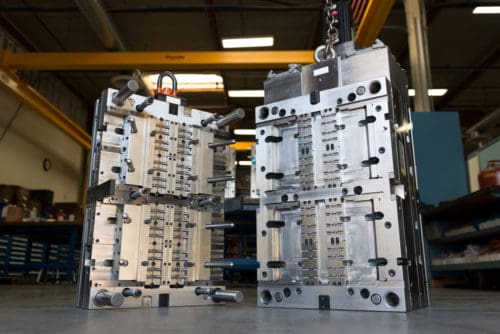
Since 1980, Fabrik Molded Plastics, Inc. has served clients in various industrial sectors as a full-service custom injection molding manufacturer. We use engineering-grade thermoplastic resins, innovative injection molding methods, and state-of-the-art equipment to provide our customers with reliable, high-performance components to suit a specific application. Our team takes a scientific approach to building molds and processing parts, offering a competitive advantage to our clients. Learn more about this injection molding method and how the team at Fabrik can support your business with precision injection molding solutions.
What Is Precision Injection Molding?
Precision injection molding is a manufacturing process with the ability to efficiently and repeatably create components with tight tolerances. Ideal for critical applications requiring uniform, accurate parts, this molding technique can provide consistent quality in medical devices, automotive parts, optics, electronics, and other instrumentation. As an example, manufacturers can mold precision automotive plastics into car parts like bumpers, door panels, throttle bodies, automotive sensors, and more. The process can even create parts that are reliable and durable enough to replace metal components, depending on the properties of the plastic material and part design. Its capability for process control helps ensure high performance in the generated components.
How Precision Molding Differs From Traditional Molding
While traditional molding is sufficient for some industry applications, precision injection molding capitalizes on more recent technological advancements that allow for enhanced quality and sealing for high-performance parts.
The main difference between precision and traditional molding lies in the tolerances, or acceptable dimension variations, that are achievable in precision molding. Most conventional molded parts have tolerances of ±0.005 inches, while precision-molded parts are capable of holding tolerances ranging from ±0.002 inches to ±0.001 inches or less.
Advantages of Plastic Injection Molding
Plastic injection molding is suitable for manufacturing consistent, affordable, and high-quality plastic parts that have applications in diverse environments or machinery. Manufacturers rely on precision plastic injection molding for the host of benefits the process offers in producing plastic components, including:
- Improved strength. Today’s thermoplastics can withstand harsh environments as well as or even better than metal parts. With precision injection molding, manufacturers can blend high-performance plastics to meet specific application requirements and create advantageous characteristics like high tensile strength or impact strength for high-quality, durable components.
- Capabilities for complex components. One of the greatest strengths of plastic injection molding is the technique’s ability to maintain accuracy and consistency in high-volume production for ideal repeatability, even for parts with highly complex configurations. However, these benefits are dependent upon the right mold design, so manufacturers must consider the ideal wall thickness, boss and rib design, weld lines, and more to achieve optimal results.
- High level of efficiency. Plastic injection molding is faster than other molding techniques. With only a short period of 15 to 120 seconds between their production cycles, manufacturers can generate a high number of molds within a shorter period, enabling high production output for greater operational efficiency and enhanced profits.
- Design and material options. Using plastics for a component’s composition gives you the flexibility to choose from a broad spectrum of design, material, finish, and color options. Polymer advancements have led to an increased selection of available resins. With plastic injection molding, you can use different materials to achieve an end product with the characteristics best suited for its application.
- Low waste production. Excess plastic produced during injection molding is recyclable, making the process a sustainable one. Plastic injection molding can utilize plastic regrinds to reduce material waste, resulting in the added benefit of cost savings.
- Labor cost savings. Much of the plastic injection molding process is automated, with many operations relying on a sole technician or operator. As a result, this lowers the labor expenditures associated with the process and reduces the risk and costs of reworking a project due to human error.
Molding Services From Fabrik Molded Plastics, Inc.
Precision molding plays a significant role in manufacturing high-quality and precision products for diverse applications, and the team at Fabrik is here to help. To remain competitive on a global scale and as part of our commitment to innovation, we utilize only the latest in molding technology and automation equipment to develop products that suit your application and budget. Contact us for any questions regarding our capabilities, or request a quote today to begin your project.

